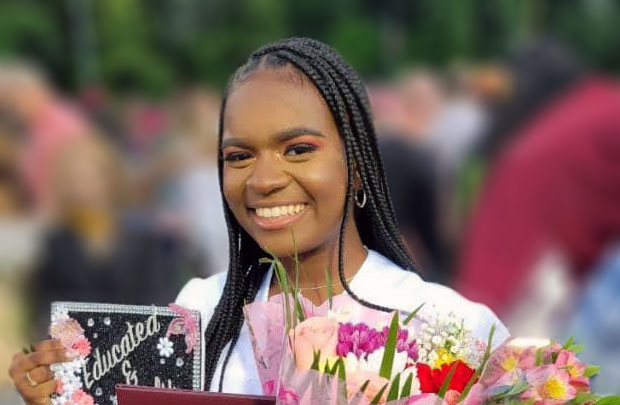
Tawanna Brown advocates on behalf of youth in foster care. When Tawanna was 12, she and her four siblings were removed from their parents’ home and entered the foster care system. Their grandmother provided kinship care and adopted the children within three years.
Following the adoption, Tawanna began to write and speak about her experiences, both as a form of therapy and to help others. Now in college, she plans to major in African American studies and aspires to become an attorney.
How did your life change after your grandmother adopted you and your siblings when you were 15?
We knew we were safe. My grandmother took in all five of us so we wouldn’t be separated, and I adore her for that.
When we were in foster care, we had to attend many meetings and therapy sessions, so it was hard for me to join sports and clubs at school. Once the adoption was finalized, I became more involved in school through activities like mock trial and track. I also began writing and speaking about my experiences. During quarantine, I continued to write and had an article published in The Imprint, a national publication dedicated to vulnerable children and families.
Adoption has been a blessing. My siblings and I are pursuing our goals and aspirations.
How did you start speaking out on children and trauma?
When I was in eighth grade, my CASA (court appointed special advocate) volunteer asked me to speak at the CASA gala, which hosted several hundred people. Later in the year, I spoke at our county’s National Adoption Day event. It was nerve-wracking standing on stage, but I cried tears of joy afterward. I realized that sharing my story meant changing my narrative. I’m not going to be another statistic.
I also advise the State of New Jersey Department of Children and Families (DCF). In high school, I was asked to serve on the Youth Council of DCF’s Office of Family Voice and have continued while in college.
“You are more than your traumas. You have the ability to create your own future, full of purpose and potential.”
—Tawanna Brown
What are the most important messages that you want to share with young people in the foster care system and those who have experienced trauma?
I believe in you. When my seventh-grade teacher said those words to me, it clicked. And so, I’m saying them to you. There are people in the world who see potential and greatness in you.
You are more than your traumas. You have the ability to create your own future, full of purpose and potential.
What advice would you give to people who are thinking about adopting teenagers through the foster care system?
I would tell them to have patience, be open-minded and accepting, and be willing to put in the work. Adoption is a learning process for children, parents, and the community that supports families through the process. Get to know yourself in order to be the best possible parent, including addressing any trauma you might have experienced.
These kids have endured so much, and stability and consistency are important for them. Be willing to love and love deeply, because your child will need a shoulder to cry on. Sometimes people are afraid to adopt a teenager because they think a teen will be hard to parent. The truth is that teenagers are big little children—still trying to love and receive love.
What are your dreams and goals?
Last year, I wanted to go on a trip outside the US when I graduated. I got a job at Marshalls, started saving, got my passport in February, and booked a six-day trip to Aruba. I have so many dreams and goals now. I’m in college, living on campus, and building a network of friends. After college, I plan to relocate to Washington, DC, and start law school. I’d like to continue public speaking for larger audiences.
Anything else that you would like to share with us?
My two favorite quotes:
“If they don’t give you a seat at the table, bring a folding chair.”—Shirley Chisholm
“The future belongs to those who prepare for it today.”—Malcolm X
These quotes have been a reminder to me that, no matter how many no’s I get, I should still show up. I know that my actions to advocate for myself and others are building a legacy.